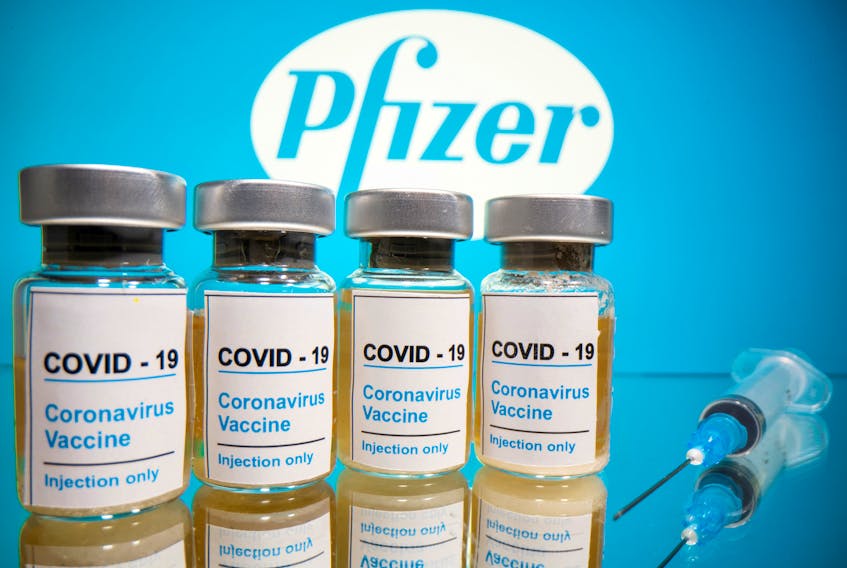OTTAWA – The federal government is running table-top exercises and simulations to iron out any potential problems with Canada’s COVID-19 vaccine rollout, but the biggest wrinkle remains exactly when the vaccines will arrive.
Canada could start seeing doses rolled out by early January, with plans for Pfizer’s vaccine to be the first distributed, said government officials.
Later in the day, Reuters reported that Pfizer was slashing its 2020 target of producing 100 million doses by half, potentially meaning delays for some countries.
But a government source speaking on background shortly after the news broke, said for the time being they did not expect it would impact Canada’s deliveries.
Deputy chief public health officer Dr. Howard Njoo said the vaccine rollout was an enormous logistical challenge.
“We are preparing for one of the most ambitious and complex vaccination programs ever delivered in this country,” he said.
No vaccines are currently approved for use in Canada, with Pfizer and Moderna the furthest through the regulatory process. Pfizer’s vaccine was approved in the U.K. on Wednesday, the first country in the world to approve it, and health officials there expect to begin vaccinations next week.
Health Canada officials said they needed another week to 10 days before they were likely to issue an approval for Pfizer and were still gathering information from the company about the vaccine’s manufacturing process, but things were progressing well.
Njoo said the precise dates were not as important as ensuring Canada was ready when the vaccines arrived.
“We shouldn’t be so obsessed with the actual delivery of the vaccines themselves, the dates and so on, I think what’s really important is the fact that we’re doing exercises. The fact that we’ll be ready,” he said. “We’re looking at all sorts of contingency planning in terms of unforeseen circumstances, obviously bad weather in Canada, winter, accidents, all those things are taken into account, so when the vaccines actually do arrive we are ready.”
Maj.-Gen. Dany Fortin, who was appointed to oversee the vaccine rollout last week, said the Public Health Agency of Canada had been doing table-top exercises and other simulations to work out all of the details with the provinces and territories.
He said supplies were moving out to provinces and territories now, in advance of the vaccine’s arrival. The government was hiring a logistics company to help with the rollout.
He said they intended to do a full exercise without the vaccine to ensure everything was in place and that everyone who would be administering the vaccine was trained.
Pfizer’s vaccine requires ultra-cold storage, at -80 C, and the company is prepared to deliver the vaccine directly to provincial and territorial storage facilities. Moderna’s vaccine, which must be kept below -20 C, will be delivered to the federal government and then shipped to provinces and territories. The federal government has purchased several ultra-cold and regular freezers and is prepared to share them with provinces and territories. It has also contracted for large amount of dry ice, which can be used to keep the Pfizer vaccine cold.
Fortin said he expected everything to be ready by mid-December even if the vaccines would not arrive until January.
“We’re hard at it in the next couple of weeks to ensure that we are ready and I kind of like the idea of being ready before the Christmas timeframe, so that we’re certain to be ready when it comes in January.”
A memo that was leaked to the media on Thursday, revealed the military still had several questions about the timetable for the rollout and was looking to have specific answers soon. Fortin said the military was used to planning without all the information.
“In the absence of clear answers on certain things, we always make assumptions and work on those assumptions and work to turn assumptions into facts.”
In the House of Commons, Conservatives demanded a clear timetable of when all of the vaccines the government had approved would be delivered.
The party’s leader, Erin O’Toole, said provincial governments and ordinary Canadians needed to know when they would have a safe, effective vaccine.
“In the G20, Canada seems to be the only one with no clear plan for vaccine distribution. Without a concrete timeline for vaccines, businesses won’t have the confidence to reinvest in their operations to rehired Canadians who’ve been laid off.”
Canadians seem less concerned about the slow rollout. An Abacus Data survey released on Wednesday found 76 per cent of people would be satisfied as long as the government made vaccines available here within a few months of them being available elsewhere in the county.
Njoo said Canada expected six million doses from Pfizer and Moderna in the first three months of 2021. He said after that doses should rise considerably from both those companies and also hopefully some of the other firms who were still completing studies and clinical trials.
“If any one of those also gets approved, and we obviously have advanced purchase agreements with those vaccine manufacturers, then we will have even additional vaccines.”
O’Toole said even with the uncertainty around approvals the government should be able to say how many vaccines Canada would get after the approvals were complete.
“That’s how business plans. That’s how the military plans. That’s how charities and nonprofits plan. Why should the federal government not reveal their plan?”
Despite O’Toole’s call for a faster timeline, Conservative MP Derek Sloan sponsored a petition in the House of Commons this week casting doubt on the approval process for vaccines and suggesting the need for a new independent committee to take a close look at the vaccines.
The petition makes several false claims and concludes that COVID-19 vaccines amount to “human experimentation.”
O’Toole dodged questions about whether he had spoken to Sloan directly about the petition, but said the government needed to provide more information about the vaccine rollout to allay concerns.
The petition has 24,000 signatures and calls for the government to “legally ensure” vaccinations are not mandatory with no “disadvantage or prejudice” for those who decline.
• Email: [email protected] | Twitter: ryantumilty
Copyright Postmedia Network Inc., 2020









